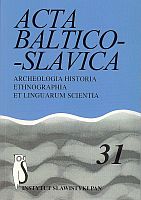Kresowa przygoda Sienkiewicza
Sienkiewicz's borderland adventure
Author(s): Tadeusz BujnickiSubject(s): Literary Texts
Published by: Instytut Slawistyki Polskiej Akademii Nauk
Keywords: Kresy; adventure; historical novel; Ukraine; Step (Steppe); Lauda
Summary/Abstract: Sienkiewicz's idea of 'borderland adventure' may be represented in two ways: as a fictional recording of the adventures of heroes and as an ideological 'adventure' of the writer. The beginning of the story contains descriptions of the prairie found in Listy z podróży do Ameryki (Letters from the Journey to America), which is associated with a literary picture of the steppes (the steppes which the writer knew from his readings of romantic literature and not from life experience). Following Kazimierz Wyka, I interpret the idea of 'borderland adventure' as an element of Sienkiewicz's obsession with the theme of “the journey” carrying on in space and time. In the context of this adventure, the important aspect we discover is that of the myth of the 'Wild West' and the typical conventions of the American 'western'. These reflections on myth can be later found in the Trylogia. After his return to his home country, Sienkiewicz, because of his American experiences, continued his historical interests, which resulted in the writing of Niewola tatarska (1880). The style of the short story reminds one of diaries written by the old polish nobility and it takes place on the Ukrainian steppe and in Crimea. From Ogniem i mieczem (1883), the writer remains committed to his idea of 'borderland adventure' following the model of sir Walter Scott and his literary convention of the history-adventure novel. In Ogniem i mieczem the 'journey' takes historical meanings in the judgement of Chmielnicki's uprising. On this background Sienkiewicz adds the fictional thread of love and adventure. Another way he has portrayed tha lands of Lithuania, on which was inscribed the 'nobel nest' – zaścianki laudańskie. Lithuania lies in a different imaginary space then Ukraine, less 'borderland' and more strongly connected with the 'centre'. Sienkiewicz's 'borderland adventure' was not only the fictional-historical adventure, but also an intellectual 'adventure', an attempt to tackle the theme of a multinational and multicultural Commonwealth. He builds a popularly valued model of the Polish-Lithuanian state, which was lost in the past, but may in the future return.
Journal: Acta Baltico Slavica
- Issue Year: 2007
- Issue No: 31
- Page Range: 51-61
- Page Count: 11
- Language: Polish

